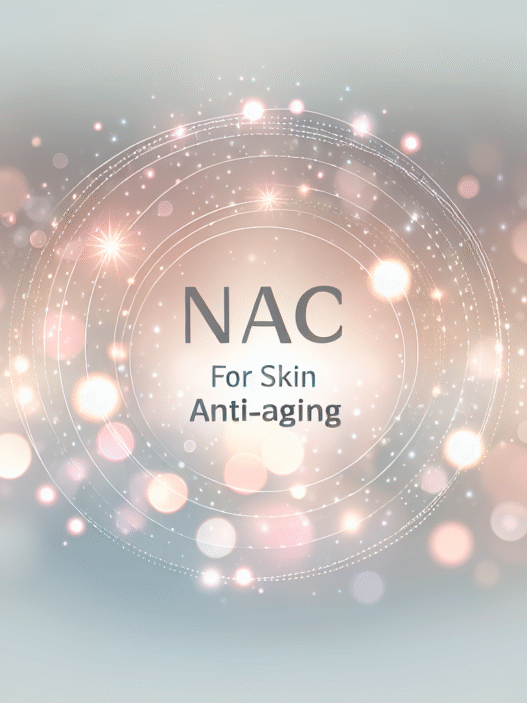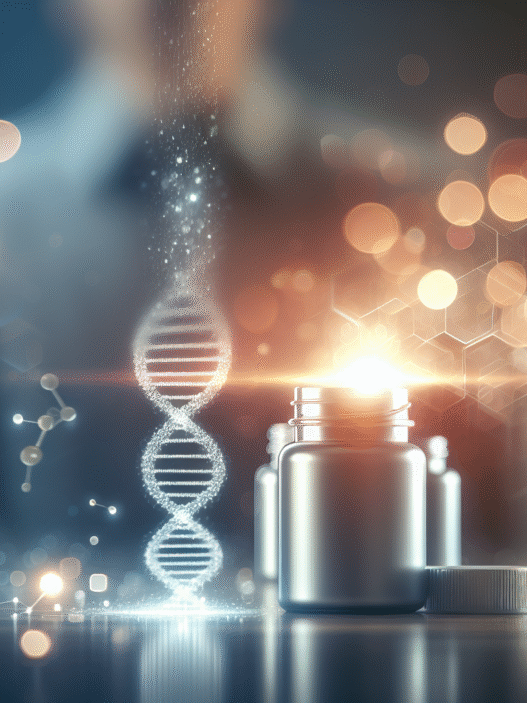Understanding N-Acetyl Cysteine (NAC)
N-Acetyl Cysteine (NAC) is recognized for its multifaceted benefits, particularly in supporting skin health. As a derivative of the amino acid cysteine, NAC plays an essential role in the body’s antioxidant systems by replenishing glutathione levels.
NAC and Antioxidant Systems
NAC is renowned in medical circles for its ability to enhance the body’s natural antioxidant systems. By replenishing glutathione, the most potent antioxidant in the body, NAC helps to neutralize free radicals and protect against environmental damage (City Skin Clinic). This process is crucial for various health aspects, including reducing the risk of oxidative stress-related conditions.
| Key Benefits of NAC in Antioxidant Defense | Description |
|---|---|
| Replenishes Glutathione | Supports overall antioxidant capacity |
| Neutralizes Free Radicals | Reduces oxidative stress |
| Protects Against Environmental Damage | Shields skin from UV exposure and pollution |
Role in Glutathione Production
One of the primary functions of NAC is supporting glutathione production. Glutathione plays a vital role in reinforcing the skin’s protective and regenerative abilities, which helps guard against UV exposure, pollution, and other environmental factors (City Skin Clinic). By maintaining optimal levels of glutathione, NAC can improve overall skin resilience and vitality.
This antioxidant support is essential not only for skin rejuvenation but also for managing skin conditions that result from environmental stressors. Individuals seeking skin rejuvenation benefits from NAC can explore its role further by looking into specific products and supplements designed for skin health, such as NAC for skin rejuvenation and NAC for skin health.
Incorporating NAC into a skincare routine may help strengthen the skin’s defenses, making it a valuable addition for those concerned with aging and skin longevity. For more insights into the potential benefits of NAC, consider reviewing related resources on n-acetyl cysteine benefits and NAC supplement benefits.
Benefits of NAC for Skin Health
N-Acetyl Cysteine (NAC) has emerged as a powerful ingredient in skincare, providing numerous benefits that enhance skin health. Among these benefits are strengthening the skin’s defenses and offering protection against environmental factors.
Strengthening Skin’s Defenses
NAC supports the skin’s natural protective and regenerative abilities primarily through its role in enhancing glutathione production. Glutathione acts as a potent antioxidant, protecting skin cells from oxidative damage caused by factors such as UV exposure and pollution (City Skin Clinic). This strengthening of the skin’s defenses allows it to better withstand various stressors and maintain its health.
By incorporating NAC into a skincare routine, individuals may experience smoother, healthier skin. Additionally, NAC can amplify the effects of other skincare ingredients, creating a more effective environment for skin health. This synergy leads to better hydration and a more even complexion.
| Benefit | Description |
|---|---|
| Strengthens defenses | Enhances glutathione production, providing antioxidant protection |
| Improves hydration | Increases moisture retention, leading to a smoother complexion |
Protection Against Environmental Factors
NAC’s antioxidant properties not only reinforce the skin’s defenses but also provide a shield against environmental factors. By combating oxidative stress caused by pollutants and UV rays, NAC helps maintain the skin’s structural integrity and appearance. The protective barrier developed through NAC application allows the skin to recover more quickly from stress, injury, or inflammation (City Skin Clinic).
Moreover, the topical application of NAC has shown promise in aiding wound healing, making it beneficial for various skin conditions.
| Environmental Factor | NAC Effect |
|---|---|
| UV Exposure | Provides antioxidant protection |
| Pollution | Reduces oxidative damage |
| Inflammation | Supports faster recovery and healing |
The potent combination of NAC’s benefits makes it a valuable addition to any skincare regimen focusing on rejuvenation and anti-aging. For further insights into the benefits of NAC for skin health, refer to our articles on n-acetyl cysteine benefits and nac for skin health.
NAC in Skincare Products
Complementary Ingredient Benefits
N-Acetylcysteine (NAC) is increasingly recognized for its role in skincare, especially for those seeking skin rejuvenation. This powerful ingredient enhances the performance of other skincare components, creating a healthier environment for the skin in response to stress, injury, infection, and inflammation. The result is smoother, better-hydrated, and more even-toned skin.
When incorporated into skincare products, NAC works effectively to bolster the skin’s natural defenses. It targets concerns related to oxidative stress and environmental damage, providing a supportive role that amplifies the effects of other active ingredients.
| Complementary Benefits of NAC | Description |
|---|---|
| Strengthens Skin Defenses | Boosts skin’s natural barrier against environmental stressors and inflammation. |
| Enhances Ingredient Performance | Improves the absorption and efficacy of co-applied skincare ingredients. |
| Promotes Even Complexion | Contributes to a smoother and brighter skin appearance. |
Synergistic Skincare Usage
NAC performs best when used in conjunction with other skincare ingredients. Its versatility allows it to complement various formulations, enhancing their benefits while acting in a supportive manner. By using NAC together with antioxidants and hydrating agents, individuals can achieve comprehensive skin health that addresses multiple concerns, from signs of aging to dryness.
For example, combining NAC with hyaluronic acid results in increased hydration and skin elasticity, while its antioxidant properties can work synergistically with vitamin C, further protecting the skin from free radical damage. This collaborative approach not only enhances the overall effectiveness of the skincare routine but also leads to more noticeable improvements in skin texture and appearance.
| Synergistic Pairings | Benefits |
|---|---|
| NAC + Hyaluronic Acid | Increased hydration and improved skin elasticity. |
| NAC + Vitamin C | Enhanced protection against oxidative stress and brighter complexion. |
| NAC + Other Antioxidants | Amplified effects in fighting free radicals and reducing signs of aging. |
Incorporating NAC into a skincare regimen allows for a multi-faceted approach to skin rejuvenation, providing protective and regenerative support. For those looking for a practical way to improve their skin health, selecting products containing NAC could be a beneficial step in achieving a youthful appearance. For more insights on NAC’s specific benefits for skin, refer to our article on n-acetyl cysteine benefits for skin.
The Versatility of NAC in Skincare
N-Acetyl Cysteine (NAC) offers numerous benefits for skincare, especially due to its powerful antioxidant properties and role in managing inflammation. Combining these properties makes NAC a versatile ingredient for those seeking skin rejuvenation.
Benefits for Oxidative Stress
Oxidative stress occurs when there is an imbalance between free radicals and antioxidants in the body. This imbalance can lead to premature aging and various skin conditions. NAC acts as a potent antioxidant, effectively neutralizing free radicals and helping to mitigate oxidative stress (City Skin Clinic).
Research suggests that NAC can enhance the performance of other skincare ingredients, creating a healthier environment for the skin. This helps protect it during times of stress, injury, or inflammation, ultimately resulting in a smoother, more even complexion.
| Benefit | Effect on Skin |
|---|---|
| Reduces free radicals | Helps prevent premature aging |
| Enhances other actives | Improves overall skin health |
| Protects skin cells | Aids in skin recovery from damage |
Support Against Inflammation
NAC’s anti-inflammatory properties make it beneficial in skincare as well. It helps soothe irritated skin, supports healing processes, and can reduce the severity of skin conditions exacerbated by inflammation. By regulating inflammation, NAC promotes a balanced skin environment, assisting in the maintenance of a clear and healthy complexion.
In addition, NAC has been shown to protect skin cells from UV-induced oxidative damage, supporting overall skin health and resilience. The potential chemopreventive role of NAC in protecting melanocytes suggests it might delay the onset of UV-induced skin conditions (PMC).
For those interested in exploring the benefits of NAC, including its role in skin rejuvenation and its anti-aging properties, incorporating NAC into skincare routines can yield significant benefits. Furthermore, understanding its effects on oxidative stress and inflammation can empower individuals to make informed decisions about their skin health and wellness.
NAC for Detoxification and Longevity
N-Acetyl Cysteine (NAC) plays a critical role in detoxifying the body and promoting longevity. It is particularly beneficial for individuals concerned about liver health and overall well-being.
Managing Detoxification
NAC is vital for detoxification processes in the body. It helps prevent kidney and liver damage, particularly in cases of acetaminophen overdose, where it is used to reduce damage to these organs. By enhancing the body’s natural detoxification pathways, NAC works to eliminate harmful substances and lower oxidative stress levels.
The following table summarizes NAC’s key detoxification functions:
| Function | Description |
|---|---|
| Organ Protection | Prevents damage to the liver and kidneys. |
| Detoxification | Aids in the removal of toxins from the body. |
| Oxidative Stress Reduction | Lowers the impact of free radicals, supporting cellular health. |
These benefits make NAC an important supplement for those seeking improved detoxification and liver function support. For more information on the general advantages of NAC, refer to our article on n-acetyl cysteine benefits.
Promoting Liver Health
In addition to its detoxifying properties, NAC is known for its positive effects on liver health. By replenishing glutathione levels—an essential antioxidant in the liver—NAC helps combat damage caused by toxins and oxidative stress. This property makes it a popular choice not only in general health but also in managing specific health conditions related to the liver.
In various studies, NAC’s ability to support liver function and reduce damage has been recognized. It has been investigated for conditions such as ischemic renal failure and as an adjunct treatment for patients undergoing cardiac surgery (Extra Context).
Individuals looking for a comprehensive approach to support liver health and detoxification can consider NAC supplementation. Monitoring dosage is key for effectiveness, and more details can be found in our article on n-acetyl cysteine dosage.
With its multifaceted benefits, NAC serves as a supportive component for detoxification and promoting longevity. Those interested in improving their skin health and addressing aging concerns can explore how it contributes to nac for skin rejuvenation as well.
Clinical Studies and Applications
Efficacy in Dermatologic Conditions
Research has demonstrated that N-Acetyl Cysteine (NAC) exhibits significant efficacy in treating various dermatologic conditions. According to a study published in PMC, NAC has been shown effective for conditions such as:
- Excoriation disorder
- Onychophagia disorder
- Trichotillomania
- Acne vulgaris
- Type I lamellar ichthyosis
- Bullous morphea
- Systemic sclerosis
- Toxic epidermal necrolysis
- Atopic dermatitis
- Xeroderma pigmentosum
- Pseudoporphyria
In one double-blind, placebo-controlled study, children and adolescents with onychophagia disorder experienced a statistically significant increase in nail length after one month of NAC treatment compared to the control group. Another study indicated that patients with trichotillomania taking NAC reported notable reductions in hair-pulling symptoms, highlighting its potential as a therapeutic intervention.
Wound Healing and Photoprotection
The application of NAC extends to wound healing, where it has demonstrated marked benefits. Topical NAC significantly increases angiogenesis and wound-breaking strength in both diabetic and non-diabetic models, showcasing its efficacy as a topical agent to enhance tissue repair (PMC).
Furthermore, NAC offers protective effects against UV-induced oxidative stress. Studies have indicated that NAC can safeguard melanocytes—cells responsible for pigment production—from damage caused by UV exposure. This protective role may not only help delay skin aging but also reduce the risk of UV-induced melanocytic tumors, indicating potential chemopreventive properties.
In conclusion, the multifaceted applications of NAC in dermatological care extend from improving specific skin conditions to enhancing wound healing and providing photoprotection, making it a valuable component of discussions surrounding nac for skin rejuvenation.





















